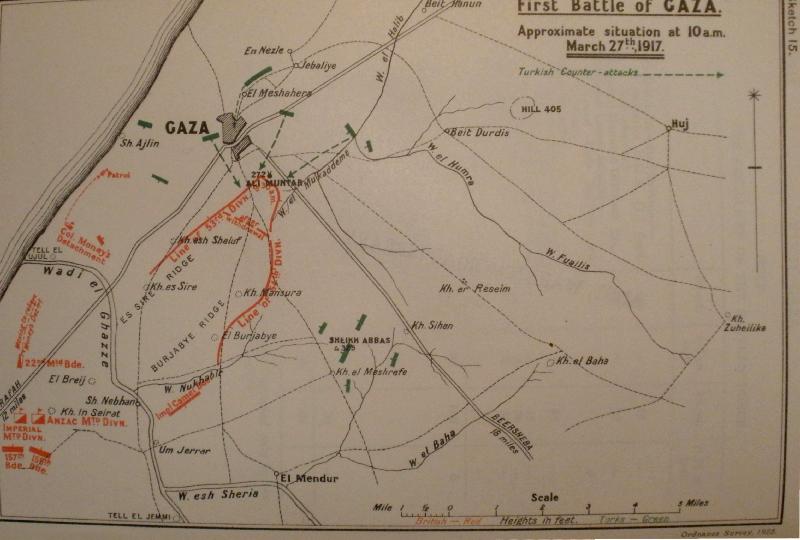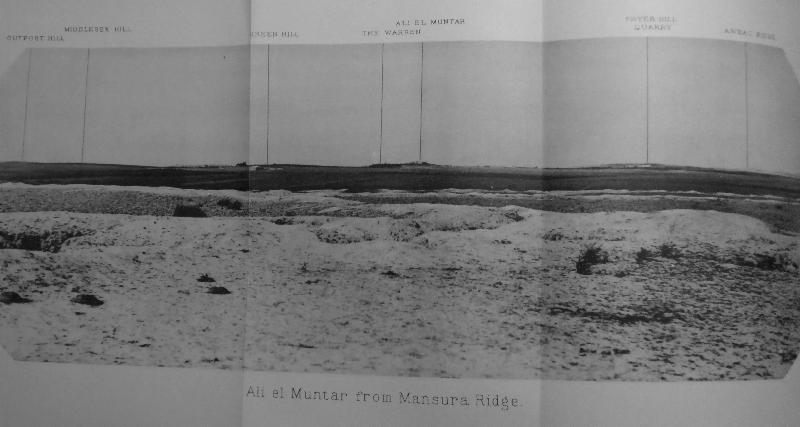Topic: BatzP - 1st Gaza
The First Battle of Gaza
Palestine, 26 to 27 March 1917
Falls Account Part 9
Falls Account, Sketch Map 15.
The following is an extract of the Falls Account from the the Official British War History volumes on Egypt written by Falls, C.; and, MacMunn, G., Military operations: Egypt and Palestine, (London 1928), pp. 279 - 325 detailing the British role at the First Battle of Gaza, Palestine, 26 to 27 March 1917.
Chapter XVII The First Battle of Gaza (Continued).
The First Battle of Gaza.The Withdrawal of the Mounted Troops and Evacuation of Ali Muntar.
The withdrawal of the mounted troops was a slow and difficult affair, not because of hostile pressure, for of that there was none until dawn, but because formations were widely scattered in the darkness and frequently intermixed, while some regiments were far from their horses-the 7th A.L.H., for example, nearly four miles-and all wounded had not yet been brought in. The artillery was first sent back under escort. The Imperial Mounted Division remained in position to cover the retirement of the troops which had been attacking Gaza.
By 2 a.m. on the 27th the A. & N.Z. Mounted Division had passed Beit Durdis, and General Hodgson ordered the concentration of the 5th and 6th Mounted and the 3rd L.H. Brigades. It was not until 5.30 a.m. that the Turks attacked the 3rd L.H. Brigade in strength, just as it was crossing the Gaza-Beersheba road near Kh. Sihan. At the moment of the attack the 7th Light Car Patrol, which had had a very exciting evening and had lain up for some hours close to Ali Muntar to give its exhausted detachments a rest, advanced down the road, and very effectively covered the retirement of the 3rd L.H. Brigade.
The "Australian Official History" quotes the following account from the personal diary of Lieutenant W. H. P. McKenzie, a New Zealand officer, in command of the 7th Light Car Patrol:At dawn we saw we were in a sticky position (near Ali Muntar) if discovered. We slipped out on to the Gaza-Beersheba road, every now and then meeting small parties of British 'lost ones,' whom we directed towards the wadi, and then hit up the pace towards Sihan, where we hoped to meet the armoured cars. They were not there.
Instead, we found the 3rd Light Horse Brigade retiring before a huge enemy force, who were bearing in heavily on them. General Royston galloped over and asked me if I could cover his retirement. This is just the kind of job we are most suited for. We ran the cars into likely positions along the ridge, and, while the brigade went by, we waited until the enemy came within range. When they were some 1,200 or 1,500 yards off, we opened fire with five machine guns. It was immense. General Royston was greatly pleased, and he asked us if we required a squadron to cover our retreat or to stand by in support. We said 'No,' so he wished us good luck, and galloped after his brigade. We were now on our own. It was the time of our lives. We placed the cars (never attempting to dismount the guns) in such positions that enemy parties, trying to avoid the fire of one, would come under the fire of another; but we could not stem a force of thousands. They kept advancing, and we retired from one ridge to another comfortably, while the 3rd Brigade got clear away across the wadi, and was secure. We had targets of mounted men and infantry, and killed at least 150 of them, and they must have had very heavy casualties altogether. We suffered no losses.
Soon after daylight all the troops of the Imperial Mounted Division were safely across the wadi. The Camel Brigade had moved meanwhile to its position continuing the 54th Division's right to the bank.
We must now go back to consider the effect of this retirement upon the position of the 53rd Division. Shortly before 7 p.m. General Chetwode telephoned to General Dallas that the mounted troops were withdrawing, that his right would thus be left in the air, and that he must withdraw it sufficiently “to make touch with the 54th Division." General Dallas protested against abandoning the ground he had won and asked that troops should be sent to close the gap between the two divisions and cover the rear of his brigades, his own reserve now amounting to only one battalion of the 161st Brigade.
Unhappily "touch with the 54th Division" meant something quite different to the two commanders. General Chetwode supposed that his own staff had informed General Dallas of the impending move of that division. General Dallas, not having received this information, was under the impression that touch was to be made at Sheikh Abbas, 4 miles from his right on Clay Hill; General Chetwode meant that touch should be made with the 54th Division's new left flank, a mile north of Mansura and not much over a mile from the 161st Brigade on Green Hill; and the misunderstanding did not become apparent in the course of their conversation. General Dallas was told that his request for more troops could not be complied with; on his further request for time in which to consider the matter, General Chetwode, after consultation with General Dobell, gave a peremptory verbal order that the right of the 53rd Division should be thrown back to meet the left of the 54th. No further order, written or verbal, was issued to the 53rd Division till nearly midnight, and it was believed to be carrying out its instructions to withdraw its right to Mansura and there make touch with the 54th Division.
At 6.35 p.m. General Dobell had informed Desert Column and the 54th Division that he contemplated with drawing the whole force across the Wadi Ghazze if Gaza did not shortly fall. By 11 p.m., however, he had become aware of the full extent of the 53rd Division's success. He also received about this time various intercepted wireless messages between Kress at Tell esh Sheria and Major Tiller, the German officer commanding the Gaza garrison, which showed that the situation of the latter was desperate. Why these messages did not reach General Dobell earlier cannot now be determined, as the originals are not to be found. The only obvious explanation is that his advanced headquarters was far from Eastern Force exchange at Rafah, that there was heavy pressure on the line forward, and that proper discretion as to the priority of messages was not exercised. The British Intelligence (E) at Cairo had the key to the Turkish cipher, picked up all the messages, and telephoned them to Rafah always within a quarter of an hour of their being deciphered and translated, and in one case within ten minutes of the message being sent out.'
The following are extracts from the private diary of Lieut.-Colonel (then Major) H. P. T. Lefroy, I. (E):"Things began to hum about mid-day, as we attacked Gaza 9 a.m. Tiller anxiously reports no sign of arrival of any reinforcements. Von Kress assures him Divs. 3 and 16 coming to his assistance. By evening Tiller reports British have entered town by N. and E., and situation very bad. Von Kress asks him concerning morale of troop commanders and troops. Tiller replies that former refuse to face combat at dawn.
“Situation at midnight (26/27) very interesting. Messages from Gaza (VKA) pessimistic. Tiller asks von Kress to attack at 2 a.m., when our [the British] artillery cannot see, as his troops cannot face any further artillery fire. Kress regrets unable, but counsels him to hold on at all costs, as he will attack with Divs. 3 and 16 from Jemmame and Sheria at 'first morning grey.' Tiller says English "in the town and occupying the battery and half the position, and unless reinforcements sent there is very little hope. W/T personnel VKA and VQT (G.H.Q. Sheria) exchange farewell messages, and arrange burn all papers, and to blow up VKA. Latter done 5.40 a.m., but our troops drew off to S.E. of town, and Gaza was not taken."
The times of the messages are not known, but there were at least four which reached Rafah prior to 6.30 p.m., all of which would have been of immense value to General Dobell had they been earlier in his hands.
At 11 p.m., therefore, being now better informed as to the situation, General Dobell instructed Desert Column that General Dallas should "dig in on his present line," throwing back his left flank and connecting his right with "the 54th Division." This message appeared merely confirmatory of the verbal orders which General Chetwode had already given General Dallas, and was therefore not repeated to the latter. General Dobell also stated that Eastern Force would take command of the 53rd Division that is, withdraw it from General Chetwode-next morning as soon as communication could be arranged, and that the 52nd Division, less one brigade, would be held in reserve at In Seirat. The 155th Brigade had been there all day and the 157th was now on the march from Khan Yunis. What was actually happening on the ridges south and east of Gaza differed radically from the conception in the minds of Generals Dobell and Chetwode. With his right north of the Gaza-Beersheba road, General Dallas saw no possibility of remaining on any part of the captured position and at the same time making touch with the 54th Division at Sheikh Abbas, when the retirement of the mounted troops had uncovered him. At 10.30 p.m. he issued orders for his whole force to withdraw to a line from the caves at Tell el Ujul, near the Wadi Ghazze, on the left, through a point a mile north of Esh Sheluf, thence to Mansura and Sheikh Abbas. This move involved a retirement of little over a mile on the Es Sire Ridge, but one of three miles between Clay Hill and Mansura. The 158th Brigade was to come into divisional reserve. General Dallas had previously telegraphed to Desert Column the line he was taking up and that he would “join up with 54th Division on western slopes of Sheikh Abbas," but the exhausted and numerically inadequate staff of General Chetwode did not even then realize the misconception of the G.O.C. 53rd Division. It was nearly midnight when General Dallas's staff discovered that the 54th Division was drawing in to north of Mansura. Had he known this movement was in progress, he would certainly not have abandoned all the captured position, probably none of it with the exception of Clay Hill. The 159th Brigade, which was to have taken over from Mansura to Sheikh Abbas, was now moved into divisional reserve. The withdrawal of the troops took a considerable time, as patrols had been pushed right into the outskirts of Gaza. Some of these did not return till dawn, but the retirement was generally complete by 4 a.m. on the 27th.
Falls Account Line of March Picture.
Previous: Falls Account Part 8, The Decision to Withdraw the Mounted Troops.
Next: Falls Account Part 10, The Reoccupation of Ali Muntar and Turkish Counter-Attacks.
Further Reading:
The First Battle of Gaza, Palestine, 26 to 27 March 1917
The First Battle of Gaza, Palestine, 26 to 27 March 1917, Allied Forces, Roll of Honour
The Palestine Campaign, 1917 - 1918
Battles where Australians fought, 1899-1920





